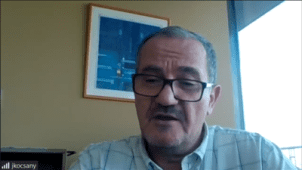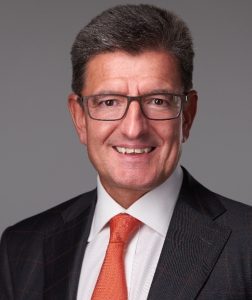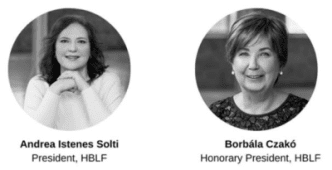The final event of the cross-border CircularRegions project (Cross-border capacity building for developing circular regions) was held on 22 March via Zoom with the participation of 100 experts, company, and NGO representatives of the Circular Economy Platforms of Slovakia and Hungary. For the circular economy to become a common practice in every business, we must show entrepreneurs the way and guide them through the first steps to successful transformation. The goal of the project was to develop an advisory service in the transition to a circular economy for small and medium-sized enterprises, to train consultants and to establish cooperation between organizations that are members of the circular economy platforms in Hungary and Slovakia, thus accelerating the transition to a circular economy in cross-border regions. This increases efficiency for entrepreneurs, brings a more stable business and a competitive advantage.
To highlight on the importance of circularity in solving climate change, we invited Vojtech Vosecky, the Associate of Circle Economy to the event. He talked about the global challenges we are facing, and showed the participants, that from the 100,6 Gt resources entering the global economy we only cycle 8,6 % of them back to the system. This is the so-called Circularity Gap level of the world, which was reported in the Circularity Gap Report 2022.

He highlighted that the solutions across housing, mobility and nutrition could deliver 70% of the required emissions cut, and a global agenda packed with circular economy strategies can close the emissions gap and bring us on a “well below 2 degrees” pathway. After the keynote speech, the project partners introduced the results of the project.
Denisa Rasova from Slovak Business Agency introduced the project itself.

Bence Janek, from IFKA has shown the results of the Mapping of the Region, which focuses on the SK-HU border regions, collects more specific information about the potential to close the material loops in the region, identify the type of companies in the selected sectors, the key stakeholders and their knowledge about circular economy and collects existing good practices.
The biggest common challenges were the following: The news about circular economy is becoming more widespread, but corporate practice still follows linear economic model; There is a lack of consumer awareness and specialists and expertise; There are deficiencies in regulatory and incentive systems. After that he presented the sector-specific recommendations, which the mapping carried out before.

Martina Velika from INCIEN introduced the developed service, the Circularity Check Tool to the participants. This tool contains 60 questions and 5 indicators, specializing in a product/service. Its advantage is that by answering the questions, it not only assesses the circularity level of the company’s product or service, but also shows for the company development opportunities. The developed project materials are all available by clicking on this link:
1/ Training manual which includes all that was covered during the workshops, including an overview of the CCH questions and guiding notes on their interpretation.
2/ Introductory consultation checklist
4/ Circularity Check questions translated to SK and HU (in Excel sheet)
5/ Circularity Check report template
6/ Training videos

But what were the general experience of the experts with the Circularity Check Assessment? To answear that question we organized a panel discussion with experts from both counties, with the moderation of Bálint Horváth from the Embassy of the Kingdom of the Netherlands in Hungary, who himself has also participated in the project as a consultant. The main findings were that using the tool was a great learning for companies and experts as well, and that the tool is not applicable for all sectors, because in the case of tourism and services it was difficult to define the scope of the assessment.

Ivett Takács from BCSDH summarized the steps of the project and talked about the piloting phase of the project. She presented the companies, who were participating in the testing. In Slovakia, 5 experts worked with 4 companies: two companies from the tourism (Patty Ski and the Penzion Harmonia), 1 construction company (Slovizol) and 1 company from the plastic industry (Novoplast). From the Hungarian side, 7 experts worked with 7 companies. 2 companies operate in the construction industry (Cube Factory, Corten Kft.), 2 companies operate in the food and packaging (NaturFood, BioFungi), 1 plastic company (Ugrinpack) and 2 companies from the tourism sector (Novotel Hotel Budapest, Irota Ecolodge). She also summarized the process of the piloting and showed the participants the output of the piloting: the report with the company-specific recommendations.

Irén Márta from BCSDH continued with the main findings of the project. She talked about the results of the two experience sharing consultation with experts, which were held last week in order to get to know the feedback of them about the piloting process. She highlighted on some possible development suggestions of the Circularity Check service and also emphasised the importance of the assessment itself as starting point for improvement.

At the end of the event, Andrej Spanik from Slovak Business Agency talked about the sustainability of the project both in Hungary and Slovakia.


***
 The project partners are the Slovak Business Agency, the Institute of Circular Economy, the Business Council for Sustainable Development in Hungary and IFKA Közhasznú Nonprofit Kft. The project is implemented under the Interreg Slovak Republic – Hungary program with the support of the European Union through the European Regional Development Fund and supported by the amount of 155 081,99 euros. The project lasts from December 2020 to March 2022.
The project partners are the Slovak Business Agency, the Institute of Circular Economy, the Business Council for Sustainable Development in Hungary and IFKA Közhasznú Nonprofit Kft. The project is implemented under the Interreg Slovak Republic – Hungary program with the support of the European Union through the European Regional Development Fund and supported by the amount of 155 081,99 euros. The project lasts from December 2020 to March 2022.
More information: www.skhu.eu | Facebook | LinkedIn






 Dr. Ágnes Fábián
Dr. Ágnes Fábián Zoltán Gazsi
Zoltán Gazsi Zsolt Jamniczky
Zsolt Jamniczky Gréta Nagy
Gréta Nagy







 Transitioning to a circular economy is a great business opportunity today. The core of the concept is not yet deeply understood by most companies, although the use of this model can increase the resilience of the world economy and facilitate the achievement of the Paris Climate Change Agreement and the United Nations Sustainable Development Goals. The circular economy could generate business opportunities worth $4.5 billion worldwide by 2030.
Transitioning to a circular economy is a great business opportunity today. The core of the concept is not yet deeply understood by most companies, although the use of this model can increase the resilience of the world economy and facilitate the achievement of the Paris Climate Change Agreement and the United Nations Sustainable Development Goals. The circular economy could generate business opportunities worth $4.5 billion worldwide by 2030.











 Participants of the eighth class, as in previous years, were typically young leaders at BCSDH’s member companies who work in a variety of disciplines. This year started in a virtual space, but thanks to the new structure of the professional days and the alleviation of the pandemic, the summer events and the Deepening Day could be organized in a hybrid form, with an increasing number of participants meeting face to face.
Participants of the eighth class, as in previous years, were typically young leaders at BCSDH’s member companies who work in a variety of disciplines. This year started in a virtual space, but thanks to the new structure of the professional days and the alleviation of the pandemic, the summer events and the Deepening Day could be organized in a hybrid form, with an increasing number of participants meeting face to face.



